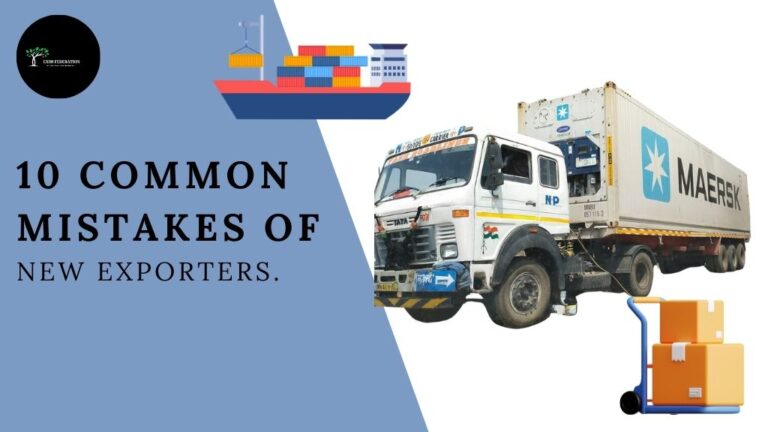10 Common Mistakes New Exporters Should Avoid
Starting an export-import business in India can be one of the rewarding journeys for entrepreneurs—but it’s also full of ups and downs, especially for beginners.
Many new exporters get into international trade with great enthusiasm but lack the right guidance & strategy.
As an export consultant, I’ve seen thousand’s of cases how small mistakes can cost businesses time, money, and credibility in International markets.
In this blog, we mainly uncover
Top 10 common mistakes new exporters make and how you can avoid them. Whether you’re launching a startup or looking to scale your current business, this guide will set you on the path to success.

Exim Federation
by Dattasa environment
Join me on a journey to make global market accessible to everyone.
1. Lack of Market Awareness & Research
Before you start you should know where your product is showing potential , By understanding & knowing your target market is very essential.
New exporters often skip Detailed research on demand, competition, and pricing overseas.
What to do instead:
You can Book A free prior consultation with us on Connecting with us .
You can visit our website for more clarity about the services which we offer
Validate demand for your product in at least two foreign markets.
Study local regulations, preferences, and cultural nuances.
Real-life case study:
A Pune-based spice exporter launched shipments to Canada without realizing the local preference for Basic labeling. His containers were stuck at customs, leading to huge losses and a damaged reputation. A quick impactful Product nexus report can defiantly guide and sail you out from such horrible positions study could have prevented it.
2. Not Understanding Export Documentation
Export is mainly a game of correct & powerful documentation isn’t just paperwork—it’s the legal backbone of your business. misguiding , Incomplete or incorrect documents can result in customs delays and penalties and some times loss of shipment as well.
Key documents every exporter must master:
Invoice & Packing List
Bill of Lading or Airway Bill
Certificate of Origin
Shipping Instructions
FSSAI or Phytosanitary certificates (if applicable)
For more details you can connect with us for personalized Report.
3. Ignoring Legal Compliance and Licenses
Without an Import Export Code (IEC) from DGFT and GST registration, your business can’t legally operate internationally.
Many startups delay this process, thinking it’s optional.
Tip:
Apply for the IEC and register your firm under Udyam or MSME to avail government benefits.
For more details you can connect with us.
4. Poor Product Selection
Exporters commonly do this kind of mistake very often choose products based on local availability or personal interest instead of global demand & Market analysis. This mistake leads to waste of time , money and funds as well.
How to choose the right product:
Explore export promotion council lists (like APEDA, FIEO).
Focus on products with low perishability and high demand (e.g., cotton fabrics, engineering goods, Ayurvedic products).
Analyze HS Codes to understand export trends.
5. Weak Logistics and Supply Chain Planning
Even if your product is top-notch & highly demanding , logistics issues can ruin your shipment. Missing shipping deadlines, relying on a single freight forwarder, or not pre-checking container availability are common errors.
Pro tip:
Build relations with multiple logistics partners and use cold storage or packhouses (especially for agri exports) that meet NCCD & APEDA guidelines.
6. Underestimating the Role of Currency and Payments
A fluctuating foreign exchange rate can make or break your profit margins. Also, new exporters often fall for unsecured payment terms.
What to do:
Understand payment methods: Advance, Letter of Credit (LC), Documents Against Payment (DAP), Open account
Always consult with your bank on hedging currency risk.
7. Branding and Packaging ISSUE
International buyers expect world-class packaging and clear labeling with personalized branding . Inadequate branding reduces your product’s shelf appeal and marketability.
Include:
Multi language tags.
QR codes with traceability
Eco-friendly packaging (which is a growing trend in Europe and Gulf countries)
- multi color labeling
8. Overlooking Trade Fairs and Networking
Staying in your office and relying only on online B2B portals like Alibaba or Indiamart won’t cut it. You need real-world exposure.
Attend:
Trade expos like IndusFood, Gulf Food, or Aahar, gulf food , Dubai 2020.
Buyer-seller meets organized by Export Promotion Councils (EPCs)
9. Not Hiring an Export Consultant
Many startups avoid hiring professionals to save costs. But in the long run, an experienced export consultant can save you lakhs in costly mistakes.
A consultant can help you with:
Product nexus report by Exim federation
Right guidance & Approch.
Connecting with genuine buyers
Availing government schemes like RoDTEP, MEIS, and TMA
10. Ignoring After-Sales Service and Buyer Feedback
Your job doesn’t end after the shipment leaves. Not following up with buyers or handling claims poorly affects your future business.
Build long-term trust by:
Seeking feedback
Offering replacements for genuine issues
Staying updated with buyer preferences
Conclusion: Export Success Begins with Awareness
Starting an export-import business holds immense potential, but avoiding these 10 mistakes can fast-track your journey. With the right preparation, expert guidance, and strategic planning, you can build a globally competitive export venture.
For more details we recommend you to get consult with Exim Federation by Dattasa Environment.
For more details you can connect with us on
Exim Federation by Dattasa environment –
+91-7276399334
